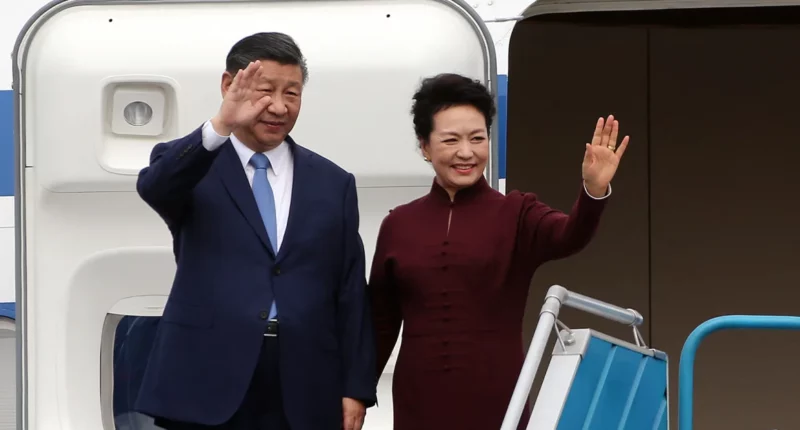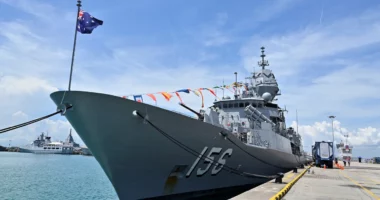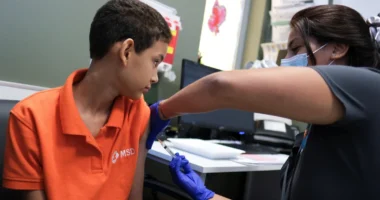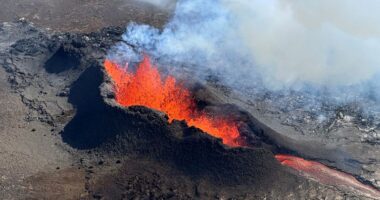China and Vietnam, two nations historically intertwined in disputes over the South China Sea, have recently pledged to foster trust and broaden collaboration. This commitment follows Hanoi’s recent strides in strengthening ties with Washington.
During a summit in Hanoi, Chinese leader Xi Jinping and Vietnamese Communist Party chief Nguyen Phu Trong emphasized the need to fortify their strategic relationship. They agreed to collaborate on various fronts, encompassing maritime patrols, trade, and crime prevention. Chinese state media hailed this as a significant “repositioning of relations” between the neighboring Communist-led nations.
Both leaders affirmed their dedication to establishing a “shared future” between their countries, employing terminology frequently used by Xi, as indicated in statements released by the official media of both sides following their meeting on Tuesday in Hanoi.
Trong, as per Vietnam News Agency (VNA), referred to Xi’s two-day visit to the capital as a “new historic milestone.” He anticipated that this visit would elevate the relations between the Communist parties and countries to unprecedented heights.
The consensus reached highlighted the commitment to “continuously strengthen political trust” and build connections “based on mutual respect, equality, and mutually beneficial cooperation.” They vowed to uphold each other’s “independence, sovereignty, and territorial integrity,” according to the Vietnamese report.
While the Vietnamese account emphasized bolstering trust, the Chinese version of the meeting released on Tuesday did not explicitly touch upon sovereignty and territorial integrity concerning their ties.
Xi and his wife, Peng Liyuan, received a warm welcome with a 21-gun salute, streets adorned with flag-waving children, and a military band during their arrival on Tuesday afternoon. This visit marks Xi’s first to Vietnam in six years and his fourth overseas trip since commencing his third term as China’s President earlier in the year.
This visit follows US President Joe Biden’s September trip to Vietnam, during which both nations upgraded their relations amid escalating trade and mutual concerns regarding China’s expanding military presence in the South China Sea.
Tensions between Vietnam and China have intensified due to Beijing’s assertiveness in militarizing artificial islands and increasing its maritime presence in the South China Sea. Vietnam, among other regional governments, contests China’s claims in this disputed area.
Agreements made during Tuesday’s meeting included plans for joint military patrols in the Gulf of Tonkin and the establishment of a hotline for addressing unforeseen incidents arising from sea-based fisheries activities, according to VNA.
This move could signify an interest in alleviating tensions. However, details about which government agencies would be involved in the hotline were not specified in the information released by the news agency, aside from its relevance to fisheries activities.
Both countries have conducted patrols in the demarcated Gulf of Tonkin in the past, even as recently as earlier this month, according to Vietnam’s national radio broadcaster.
Trong, during his meeting with Xi, stressed the importance of respecting each other’s legal and legitimate interests, avoiding complications, and resolving disputes peacefully in accordance with international laws, reported by VNA.
Xi, in his remarks, urged both China and Vietnam to transform challenges posed by maritime issues into opportunities for bilateral cooperation.
These discussions occurred against the backdrop of heightened tensions in the South China Sea.

Beijing asserts “indisputable sovereignty” over nearly the entire waterway, including numerous features located hundreds of miles away from mainland China. Competing claims are held by the Philippines, Malaysia, Vietnam, Brunei, and Taiwan.
Recent months have witnessed non-violent confrontations between Chinese and Filipino vessels as Manila seeks to safeguard its claims, while China disregards a 2016 ruling from an international tribunal denying Beijing’s historic rights over the bulk of the South China Sea.
Despite establishing a hotline earlier this year between their foreign ministries’ ocean affairs bureaus to prevent potential miscommunication in disputed waters, tense encounters persist between Chinese and Filipino vessels.
Similar encounters have occurred between Chinese and Vietnamese vessels in recent years, exacerbating the existing mistrust between the neighboring nations.
Xi’s visit to Vietnam coincides with his efforts to stabilize diplomatic relations with key partners as Beijing faces domestic economic challenges and grapples with an ongoing rivalry with Washington.
On Tuesday, Xi expressed belief that Vietnam would continue supporting China in opposing external interference and advancing its aim of national reunification. This comment alluded to China’s tensions with the US and its pursuit of control over Taiwan, a self-ruled island claimed by the Chinese Communist Party.
The 36 agreements signed between Beijing and Hanoi also encompassed enhanced cooperation in propaganda, crime prevention, trade, transportation, digital economy, and telecoms, according to VNA.
Both sides emphasized promoting collaboration between Vietnam’s “Two Corridors, One Belt” framework and Xi’s Belt and Road infrastructure initiative. While Hanoi has supported the scheme, it has been cautious in accepting substantial Chinese funds.
The agreements from Tuesday suggest that China might offer assistance for the development of a cross-border railway, although details remain limited.
Additionally, the two leaders signed a memorandum of understanding to strengthen cooperation in the digital economy and digital data, potentially boosting Xi’s Digital Silk Road, the technological connectivity aspect of the Belt and Road initiative.
On Wednesday, Xi continued his visit by meeting with Vietnam’s Prime Minister Pham Minh Chinh, the Chairman of Vietnam’s National Assembly Vuong Dinh Hue, and Vietnamese President Vo Van Thuong.





